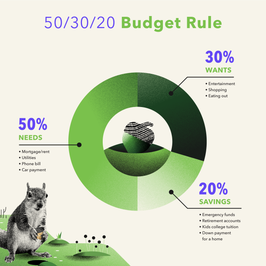7 Best Finance Books of 2022

You didn’t know your employer offered a 401(k) match. And you didn’t realize your student loans accrued interest while you were still in school. You had no idea how quickly interest could accrue when you carry a balance on your credit card.
Sound familiar? Many people feel like they don’t understand their personal finances. In fact, the National Financial Educators Council reported that Americans lost an average of $1,389 in 2021 due to a lack of financial knowledge.
There are lots of personal finance books out there that can give you the information you need to manage your money with confidence. While mainstays like Dave Ramsey’s “The Total Money Makeover” and Suze Orman’s “The Money Book for the Young, Fabulous & Broke” are popular, there are other options from a diverse range of authors with different areas of expertise that can help you build your financial confidence.
Check out our picks for the seven best finance books to help you improve your money management skills.
1. “Get Good With Money” by Tiffany Aliche: Best for Creating an Action Plan
For those that have made money mistakes in the past — such as borrowing too much to pay for college or raiding an emergency fund for a shopping spree — feelings of shame and guilt can make it tough to get ahead.
Tiffany Aliche, founder of The Budgetnista, a financial education company, wrote “Get Good With Money” after experiencing her own missteps, including listening to a scam financial advisor that caused her to end up significantly in debt.
From her experience, Aliche created the book to help those struggling to get a handle on their money build an action plan. The book is full of assessment tools and assignments to empower you to get on track. It’s comprehensive, with each chapter focusing on a different aspect of finance, from building a budget to digging yourself out of debt.
Because the book touches on so many topics, it can’t do a thorough breakdown of each area. For example, there are few tips on handling student loan or mortgage debt. Instead, the book focuses on credit cards and other forms of consumer debt.
2. “The Simple Path to Wealth” by JL Collins: Best for Novice Investors
JL Collins’ “Simple Path to Wealth” shows that investing can be accessible to everyone, regardless of income or background.
“The Simple Path to Wealth” is a book on investing with a simple, straightforward approach. It covers what accounts to use, what types of investments to consider — and more importantly, which to avoid — and how to plan for retirement.
This book is focused on a long-term, passive approach to investing. Those looking for tips on picking individual stocks and alternative investment options like cryptocurrency are likely to be disappointed. But investors who want a roadmap for long-term investing will find the material invaluable.
3. “Broke Millennial” by Erin Lowry: Best for Recent College Graduates
Many personal finance books assume a certain level of financial accomplishments. They may work off the assumption that you have a steady income or own a home. For recent college graduates and young adults starting out, the advice in those books may be out of touch.
Erin Lowry’s “Broke Millennial” addresses that problem with step-by-step guidance specifically written for the unique challenges facing young adults. It can help college graduates who have never had a paycheck before, those living hand to mouth and want to break the cycle, and those drowning in student loan debt. Lowry makes complicated topics easier to understand with simple advice and examples from real people, so you can improve your relationship with money.
Those who are in a more stable financial position or further in their careers may not find the book as useful since it's geared towards young adults, but it has plenty of foundational knowledge that can be applied to all aspects of personal finance.
4. “Money Hacks” by Lisa Rowan: Best for Budgeting
Books that deal with personal finances can be full of industry jargon and overwhelming for people trying to learn the basics.
Lisa Rowan’s “Money Hacks” is a different sort of book. It breaks down managing your money into 280 “hacks,” giving you easily digestible, actionable information.
Each chapter is focused on one aspect of money management. Chapter 1, for example, focuses on curbing mindless spending, while chapter 2 includes tips on saving money.
Rowan’s book is best for those new to handling their finances or who have had trouble sticking to a budget in the past. Each money hack will teach you how to follow your spending plan, save money, and plan for the future.
There are times when the snippets in each hack are short, particularly in the investing and retirement sections. Readers may find that they don’t have enough information about how to implement those hacks using just the information from the book. But it does provide some important tips that may motivate readers to seek out more help.
5. “I Will Teach You to Be Rich” by Ramit Sethi: Best for General Money Management
Ramit Sethi, a best-selling entrepreneur, published “I Will Teach You to Be Rich” in 2009. Since then, it's become a go-to money manual for those looking to overhaul their financial lives. Sethi has updated the book to include advice applicable to today’s economy and broaden its reach to older audiences.
“I Will Teach You to Be Rich” is a six-week program that teaches readers how to pay down debt, automate their finances, negotiate lower rates, and invest for the future. It’s an excellent, comprehensive overview, making it a valuable resource for someone looking for tips on building wealth.
Sethi contains specific scripts and guides on how to negotiate with creditors and lenders, and also shares information about how psychology can affect how we spend money. By being aware of those influences, you can better control your spending and plan for the future.
Sethi’s tone and style aren’t for everyone, but the book delivers valuable information and tips.
6. “The Millionaire Next Door″ by Thomas J. Stanley: Best for Retirement Planning
If you’re unhappy with the life you’re leading and feel like you’re stuck in the rat race, Thomas Stanley’s “The Millionaire Next Door” is a must-read. This best-selling book covers the seven habits of self-made millionaires.
Stanley highlights how you may never know who is actually a millionaire. Many are driving modest, older cars, and live in tidy bungalows rather than sprawling mansions. And it’s because of those decisions that those people became millionaires, Stanley concludes.
Stanley’s book shares how you can gain financial independence and retire as a millionaire without a six-figure job. He focuses on long-term investing to build a financial nest egg so people have more freedom and control over their lives.
Stanley is primarily focused on frugality, so those who don’t want to live a minimalist lifestyle may find his advice too restrictive. But it could be motivating for those who may have thought saving for retirement was impossible.
7. “Get Money” by Kristin Wong: Best for Managing Debt
Kristin Wong knows what it’s like to be broke and in debt. So “Get Money” is a book filled with actionable tips and useful advice — without judgment or shame. For those that may be struggling with credit card debt or living paycheck to paycheck, Wong’s empathetic approach may resonate.
Wong explains the importance of an emergency fund (what she calls an “Oh Crap Fund”), rebuilding your credit, and how to pay off credit card bills. Her approach to debt repayment is especially refreshing, since she eliminates the sense of guilt and is instead future-focused. She outlines a three-step plan for debt that includes calculating your current debt, choosing a strategy to pay it off, and prioritizing which debt to pay off first.
Wong’s gamified approach to personal finance can make paying down debt and budgeting easier and more enjoyable. Those who are more established and stable with their finances may find that the information is too basic. But if you’re overwhelmed by credit card debt and student loans, Wong’s book could be a game-changer.
Building your financial knowledge
Whether you want to learn how to save for retirement or how to pay off your student loans, there are books out there that can help you accomplish your goals. Reading about personal finance can be eye-opening and empowering, giving you the tools and knowledge you need to make sound financial decisions.
This material has been presented for informational and educational purposes only. The views expressed in the articles above are generalized and may not be appropriate for all investors. The information contained in this article should not be construed as, and may not be used in connection with, an offer to sell, or a solicitation of an offer to buy or hold, an interest in any security or investment product. There is no guarantee that past performance will recur or result in a positive outcome. Carefully consider your financial situation, including investment objective, time horizon, risk tolerance, and fees prior to making any investment decisions. No level of diversification or asset allocation can ensure profits or guarantee against losses. Article contributors are not affiliated with Acorns Advisers, LLC. and do not provide investment advice to Acorns’ clients. Acorns is not engaged in rendering tax, legal or accounting advice. Please consult a qualified professional for this type of service.








